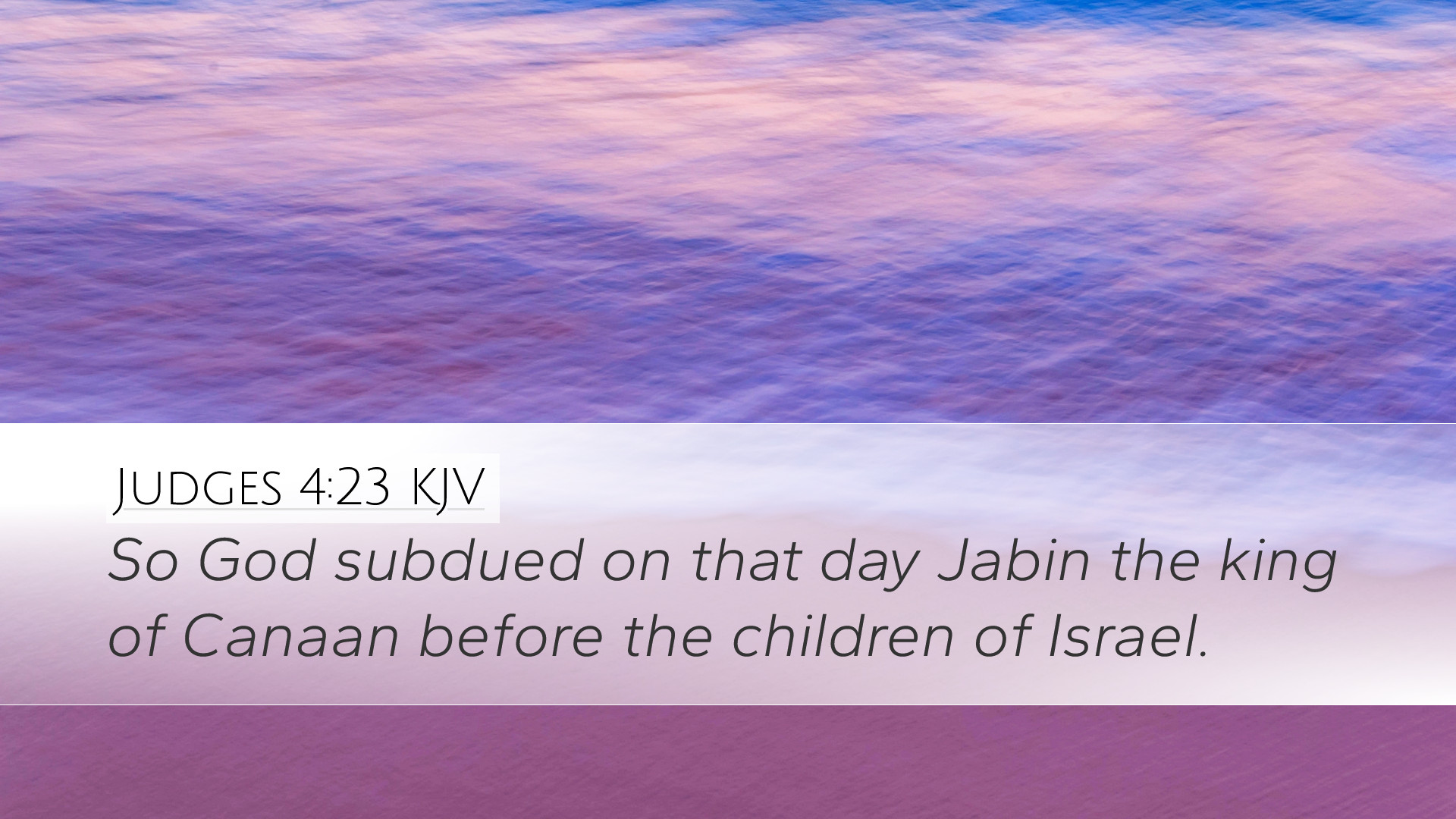Old Testament
Genesis Exodus Leviticus Numbers Deuteronomy Joshua Judges Ruth 1 Samuel 2 Samuel 1 Kings 2 Kings 1 Chronicles 2 Chronicles Ezra Nehemiah Esther Job Psalms Proverbs Ecclesiastes Song of Solomon Isaiah Jeremiah Lamentations Ezekiel Daniel Hosea Joel Amos Obadiah Jonah Micah Nahum Habakkuk Zephaniah Haggai Zechariah MalachiJudges 4:23
Judges 4:23 KJV
So God subdued on that day Jabin the king of Canaan before the children of Israel.
Judges 4:23 Bible Commentary
Commentary on Judges 4:23
Verse: "So God subdued on that day Jabin king of Canaan before the children of Israel."
Introduction
The Book of Judges narrates the tumultuous period in Israel's history when they were under oppression and subsequently delivered by God through leaders known as judges. Judges 4 recounts the story of Deborah and Barak's victory over the Canaanites, specifically focusing on the defeat of Jabin, the king of Canaan. This verse encapsulates the divine intervention and sovereignty of God in facilitating Israel's victory.
Contextual Analysis
This victory is pivotal within the broader narrative of the Book of Judges. Israel had turned from God, leading to cycles of oppression and restoration. Jabin's reign represented one of these oppressions, and the deliverance through Deborah and Barak highlights God's fidelity to His people despite their failings.
Theological Implications
Judges 4:23 emphasizes several essential theological themes:
- The Sovereignty of God: The text illustrates God's ultimate authority over nations and leaders. It demonstrates that the power of kings is subject to God's will.
- Divine Provision: Jabin's defeat is not merely a human achievement; it underscores God's role as the true deliverer. God equipped Deborah, Barak, and Jael to accomplish what seemed impossible.
- Faithfulness in Adversity: This verse encapsulates God's response to Israel's cry for help. It confirms that God remains faithful to His covenant, promising deliverance even when His people stray.
Commentary Insights
Matthew Henry's Commentary
Matthew Henry emphasizes the importance of God's intervention in the affairs of men, noting that the power of Jabin was brought to naught by divine decree. He reflects on God's providence and timing, illustrating how God subdued Jabin not only for the benefit of Israel but also as part of His greater plan. Henry argues that Israel’s faithfulness and obedience were crucial, as they aligned themselves with God's will as evidenced through Deborah's leadership.
Albert Barnes' Commentary
Albert Barnes elaborates on the significance of this verse in the historical context of Israel's conquest. He notes that the defeat of Jabin was a crucial turning point. Barnes highlights that the subjugation of Jabin demonstrates God's mercy despite Israel's recurrent disobedience. He posits that the narrative reflects the powerful alliance between divine action and human response, where Barak's military leadership and Jael's decisive act against Sisera played pivotal roles under God's guidance.
Adam Clarke's Commentary
Adam Clarke discusses the implications of God's subduing of Jabin, emphasizing that such victories are a direct result of divine favor. He asserts that God’s hand operates through chosen instruments, pointing especially to Deborah's role as a prophetess and judge. Clarke encourages readers to view the events as metaphorical, illustrating the struggle between the forces of good and evil. The subjugation of Jabin serves as an allegory of the ultimate victory of divine truth and justice over oppression and tyranny.
Practical Applications
This verse is laden with practical applications for contemporary readers:
- Confidence in God's Power: Believers can draw strength from the assurance that God can and does intervene in human affairs. No earthly power can withstand His authority.
- Call to Leadership: Just as Deborah and Barak answered the call to lead, modern believers are encouraged to act bravely in faith and be open to God's calling in their lives.
- Hope in Despair: In moments of hardship, this verse serves as a reminder that deliverance is on the horizon, reinforcing the promise of God's faithfulness to those who turn to Him.
Conclusion
Judges 4:23 serves not only as a historical record of Israel's victory but also as a profound testament to the sovereignty and faithfulness of God. Through various commentators, we see diverse aspects of God's interaction with Israel during a critical time in their history. This verse reminds us of the eternal truths about God's character, encouraging believers to trust in His divine plan and engage faithfully in their service to Him.


